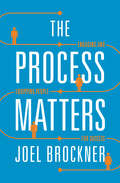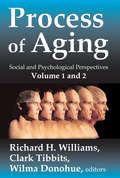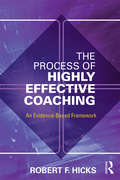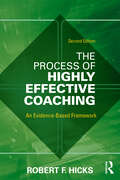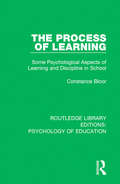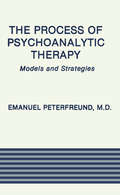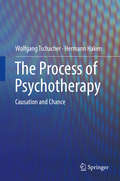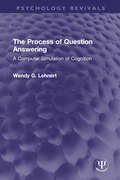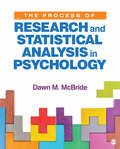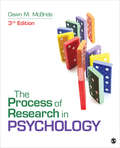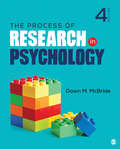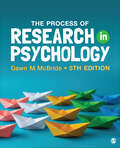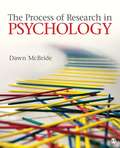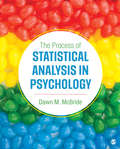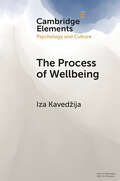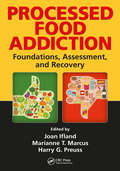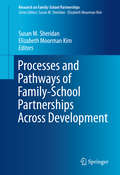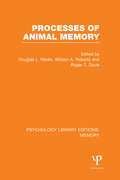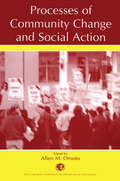- Table View
- List View
The Process Matters
by Joel BrocknerWe do business in a results-oriented world. Our focus on growth is laudable for its clarity, but one of its downsides is that firms can lose sight of the process: how business gets done and the individuals or employees through whom results are achieved. This leads to compromised decisions and unethical behavior. It is not just what we accomplish that matters but also how we accomplish it. In The Process Matters, Joel Brockner shows that managers have to do more than just meet targets and goals. They have to reach those ends in the right ways--with input, consistency, and accountability--if they want to effectively lead and manage in their organizations. Brockner discusses what goes into the right process, how it leads to better outcomes, why it is easier said than done, and how to overcome obstacles along the way. Brockner demonstrates that a high-quality process often costs little and may not even require a great deal of time. In light of these facts, he considers the puzzling question of why good business practice doesn't happen more often. Brockner draws from various real-life workplace examples--from Jay Leno's departure (twice) from his TV show, to the improvement of shooting accuracy in the U.S. Navy, to the surprising results of layoffs in Canada. He also factors in a wide swath of studies to examine such issues as the importance of perceived fairness in the process, the management of organizational change, and the encouragement of a strong sense of self in those involved in decisions--in short, the ways that managers can bring out the best in their people. Relevant to anyone who is in a managerial position--from the CEO on down--The Process Matters proves that seemingly simple differences in process can go a long way.
Process of Aging: Social and Psychological Perspectives
by David PopenoeProcesses of Aging: Social and Psychological Perspectives is based on a monumental series of studies on the psychological and social aspects of aging in relation to mental health. This effort gives scientists from North America and Europe an opportunity to explore the concepts, methodological problems, and conclusions of their researches in the rapidly growing field of gerontology. Much work has been done in an attempt to present this material in sequential and systematic fashion. Original work of sixty-six research workers from twelve countries is represented in this two-volume set. They offer an inventory of principal fields of gerontological research, in advanced countries. Human aging, in its many ramifications, is becoming one of the major areas of research interest among an increasing number of students in the biological, behavioral, and social sciences. Although the phenomena of aging were largely overlooked as subject matter for research during the early stages in the development of all basic sciences, it was inevitable that students would eventually become curious about the final processes of maturation. Events of recent years have hastened the need for social action on behalf of older people and, consequently, the need for scientific knowledge about their characteristics, circumstances, and requirements. Processes of Aging: Social and Psychological Perspectives will be of interest to research workers, teachers, and advanced students concerned with the psychological, psychiatric, psychosocial, and socioeconomic aspects of aging. Many of the theoretical and analytical discussions and the specific studies offer guidance for top-level planners and policy administrators in public agencies and voluntary organizations. This volume is highly sensitive to older people as such: how they feel about themselves and the world, and in the way they behave in relation to others. It is must reading in the health and welfare of aging.
The Process of Highly Effective Coaching: An Evidence-Based Framework
by Robert F. HicksThe Process of Highly Effective Coaching offers a unique blend of theory and practical methods for conducting effective coaching conversations. It provides an umbrella under which all of the major conceptual models for helping people change can not only coexist but work together. In addition to using this integrative approach, The Process of Highly Effective Coaching presents a framework for conducting coaching conversations and for relating the coaching process to the coaching competencies defined by the International Coach Federation, the largest coach-credentialing organization in the world.
The Process of Highly Effective Coaching: An Evidence-Based Framework
by Robert F. HicksThe Process of Highly Effective Coaching, 2nd edition, offers a unique blend of theory and practical methods for conducting effective coaching conversations. The book presents a framework for navigating a conversation’s dynamic flow, enabling the practitioner to assimilate information and exhibit the agility of master-level coaches. Additionally, the framework synergistically incorporates the major evidence-based models for achieving client-driven outcomes. This second edition contains fresh content that ties the Foursquare Coaching Framework to the latest information from neuropsychology, leadership, and organizational change.
The Process of Learning: Some Psychological Aspects of Learning and Discipline in School (Routledge Library Editions: Psychology of Education)
by Constance BloorOriginally published in 1930, this book was designed to meet the needs of students in Training Colleges. It is the outcome of first-hand experience of the difficulties encountered by students in the subject of educational theory and its application to the problems of the classroom at the time. It was the hope of the writer that this book may help the student to find a profitable connection between the theory of the lecture room and the problems of the school classroom.
The Process of Psychoanalytic Therapy: Models and Strategies
by Emanuel PeterfreundIn his extensive description of the heuristic approach to psychoanalytic therapy, Peterfreund discusses the strategies used by both patient and therapist as they move toward discovery and deeper understanding.
The Process of Psychotherapy: Causation and Chance
by Hermann Haken Wolfgang TschacherThis book describes an encompassing modeling approach to psychotherapy, created with the most recent research in the field. Therapeutic interventions are staged within a therapist-client relationship ('alliance'), and become effective by the interplay of deterministic ('causation') and stochastic ('chance') forces. The authors use a Fokker-Planck approach complemented by a structural-mathematical framework from complexity theory. Chapters present statistical tools, which can be applied to analyze the differing time series that depict therapeutic processes. Chapters include examples of how to use these tools within research. The approach adopted in the book – contemporary psychotherapy terminology combined with a systems-theoretical model and algorithms for quantitative psychotherapy research – has the potential to become the new benchmark in psychotherapy. The Process of Psychotherapy is an informative and sophisticated resource for all levels of students, from undergraduate through post-doctoral studies, in the fields of psychology, cognitive psychology, and psychotherapy.
The Process of Question Answering: A Computer Simulation of Cognition (Psychology Revivals)
by Wendy G. LehnertOriginally published in 1978, The Process of Question Answering examines a phenomenon that relies on many realms of human cognition: language comprehension, memory retrieval, and language generation. Problems in computational question answering assume a new perspective when question answering is viewed as a problem in natural language processing. A theory of human question answering must necessarily entail a theory of human memory organization and theories of the cognitive processes that access and manipulate information in memory. This book describes question answering as a particular task in information processing. The theoretical models described here have been built on a formulation of general theories in natural language processing: theories about language that were developed without the specific problem of question answering in mind. By requiring programmers to be concerned with the precise form of information in memory, and the precise operations manipulating that information, they can uncover significant problems that would otherwise be overlooked. An early insight into artificial intelligence, today this reissue can be enjoyed in its historical context.
The Process of Research and Statistical Analysis in Psychology
by Dawn M. McBrideThe Process of Research and Statistical Analysis in Psychology presents integrated coverage of psychological research methods and statistical analysis to illustrate how these two crucial processes work together to uncover new information. Best-selling author Dawn M. McBride draws on over 20 years of experience using a practical step-by-step approach in her teaching to guide readers through the full process of designing, conducting, and presenting a research study. The text opens with introductory discussions of why psychologists conduct and analyze research before digging into the process of designing an experiment and performing statistical analyses. Each chapter concludes with exercises and activities that promote critical thinking, the smart consumption of research, and practical application. Readers will come away with a complete picture of the role that research plays in psychology as well as their everyday lives.
The Process of Research and Statistical Analysis in Psychology
by Dawn M. McBrideThe Process of Research and Statistical Analysis in Psychology presents integrated coverage of psychological research methods and statistical analysis to illustrate how these two crucial processes work together to uncover new information. Best-selling author Dawn M. McBride draws on over 20 years of experience using a practical step-by-step approach in her teaching to guide readers through the full process of designing, conducting, and presenting a research study. The text opens with introductory discussions of why psychologists conduct and analyze research before digging into the process of designing an experiment and performing statistical analyses. Each chapter concludes with exercises and activities that promote critical thinking, the smart consumption of research, and practical application. Readers will come away with a complete picture of the role that research plays in psychology as well as their everyday lives.
The Process of Research in Psychology
by Dawn M. McbrideUsing diverse examples from published research, the Third Edition of The Process of Research in Psychology by Dawn M. McBride provides step-by-step coverage on how to design, conduct, and present a research study. Early chapters introduce important concepts for developing research ideas while subsequent "nuts and bolts" chapters provide more detailed coverage of topics and examine the types of research relevant to the field. This logical two-part structure creates an excellent foundation upon which students can build their knowledge of the entire research process.
The Process of Research in Psychology
by Dawn M. McBrideUsing diverse examples from published research, the Third Edition of The Process of Research in Psychology by Dawn M. McBride provides step-by-step coverage on how to design, conduct, and present a research study. Early chapters introduce important concepts for developing research ideas while subsequent "nuts and bolts" chapters provide more detailed coverage of topics and examine the types of research relevant to the field. This logical two-part structure creates an excellent foundation upon which students can build their knowledge of the entire research process.
The Process of Research in Psychology
by Dawn M. McBrideThe Process of Research in Psychology employs the pedagogical approach of spaced repetition to present a student-friendly introduction to conducting research in psychology. Drawing on more than 17 years of teaching experience, best-selling author Dawn M. McBride covers topics with step-by-step explanations to help students understand the full process of designing, conducting, and presenting a research study. Early chapters introduce important concepts for developing research ideas, subject sampling, ethics, and data collection; more detailed coverage of these topics is included in “More About” chapters to provide instructors with flexibility in their teaching. Concepts and skills relevant to more than one stage of the research process are covered in multiple contexts, providing repeated exposure to the topics students often struggle with but that are the most important in gaining research skills.
The Process of Research in Psychology
by Dawn M. McBrideThe Process of Research in Psychology employs the pedagogical approach of spaced repetition to present a student-friendly introduction to conducting research in psychology. Drawing on more than 17 years of teaching experience, best-selling author Dawn M. McBride covers topics with step-by-step explanations to help students understand the full process of designing, conducting, and presenting a research study. Early chapters introduce important concepts for developing research ideas, subject sampling, ethics, and data collection; more detailed coverage of these topics is included in “More About” chapters to provide instructors with flexibility in their teaching. Concepts and skills relevant to more than one stage of the research process are covered in multiple contexts, providing repeated exposure to the topics students often struggle with but that are the most important in gaining research skills.
The Process of Research in Psychology
by Dawn M. McBrideWith a structure focused on process over memorization, best-selling author Dawn M. McBride′s The Process of Research in Psychology, Fifth Edition covers topics with a step-by-step approach to help students understand the full progression of developing, conducting, and presenting a research study from start to finish. Early chapters introduce important concepts for developing research ideas, subject sampling, ethics, and data collection; more detailed coverage of these topics is included in the "More About" chapters to provide instructors with flexibility to focus on the methods students will use in their projects. Concepts and skills relevant to more than one stage of the research process are covered in multiple contexts to give students repeated opportunities to learn about the most important, and often most difficult, research concepts at the moment they’re used. This new Fifth Edition features added discussion on validity and reliability; a reorganized chapter on survey research to group topics more clearly and to provide more information on qualitative analysis; more questions in the "Test Yourself" quizzes at the end of each chapter to focus more on application; and additional references to the increasingly popular statistical software programs JASP and R. This title is accompanied by a complete teaching and learning package. Contact your Sage representative to request a demo. Learning Platform / Courseware Sage Vantage is an intuitive learning platform that integrates quality Sage textbook content with assignable multimedia activities and auto-graded assessments to drive student engagement and ensure accountability. Unparalleled in its ease of use and built for dynamic teaching and learning, Vantage offers customizable LMS integration and best-in-class support. It’s a learning platform you, and your students, will actually love. Learn more. Assignable Video with Assessment Assignable video (available in Sage Vantage) is tied to learning objectives and curated exclusively for this text to bring concepts to life. Watch a sample video now. LMS Cartridge: Import this title’s instructor resources into your school’s learning management system (LMS) and save time. Don’t use an LMS? You can still access all of the same online resources for this title via the password-protected Instructor Resource Site. Learn more.
The Process of Research in Psychology
by Dawn M. McBrideWith a structure focused on process over memorization, best-selling author Dawn M. McBride′s The Process of Research in Psychology, Fifth Edition covers topics with a step-by-step approach to help students understand the full progression of developing, conducting, and presenting a research study from start to finish. Early chapters introduce important concepts for developing research ideas, subject sampling, ethics, and data collection; more detailed coverage of these topics is included in the "More About" chapters to provide instructors with flexibility to focus on the methods students will use in their projects. Concepts and skills relevant to more than one stage of the research process are covered in multiple contexts to give students repeated opportunities to learn about the most important, and often most difficult, research concepts at the moment they’re used. This new Fifth Edition features added discussion on validity and reliability; a reorganized chapter on survey research to group topics more clearly and to provide more information on qualitative analysis; more questions in the "Test Yourself" quizzes at the end of each chapter to focus more on application; and additional references to the increasingly popular statistical software programs JASP and R. This title is accompanied by a complete teaching and learning package. Contact your Sage representative to request a demo. Learning Platform / Courseware Sage Vantage is an intuitive learning platform that integrates quality Sage textbook content with assignable multimedia activities and auto-graded assessments to drive student engagement and ensure accountability. Unparalleled in its ease of use and built for dynamic teaching and learning, Vantage offers customizable LMS integration and best-in-class support. It’s a learning platform you, and your students, will actually love. Learn more. Assignable Video with Assessment Assignable video (available in Sage Vantage) is tied to learning objectives and curated exclusively for this text to bring concepts to life. Watch a sample video now. LMS Cartridge: Import this title’s instructor resources into your school’s learning management system (LMS) and save time. Don’t use an LMS? You can still access all of the same online resources for this title via the password-protected Instructor Resource Site. Learn more.
The Process of Research in Psychology (1st edition)
by Dawn M. McbrideThe book offers a clear description of concepts and skills important for conducting psychological research with clear, simple examples to illustrate these concepts. Author Dawn McBride covers the material in a methods text, but organizes as chronological steps in designing, conducting, and presenting a psychology research study. The concepts are presented using the special pedagogical approach throughout the text to present students with various learning opportunities in multiple contexts.
The Process of Statistical Analysis in Psychology: Mcbride: The Process Of Statistical Analysis In Psychology (paperback) + Mcbride: The Process Of Statistical Analysis In Psychology (paperback)
by Dawn M. McBrideThis new introductory statistics text from Dawn M. McBride, best-selling author of The Process of Research in Psychology, covers the background and process of statistical analysis, along with how to use essential tools for working with data from the field. Research studies are included throughout from both the perspective of a student conducting their own research study and of someone encountering research in their daily life. McBride helps readers gain the knowledge they need to become better consumers of research and statistics used in everyday decision-making and connects the process of research design with the tools employed in statistical analysis. Instructors and students alike will appreciate the extra opportunities for practice with the accompanying Lab Manual for Statistical Analysis, also written by McBride and her frequent collaborator, J. Cooper Cutting.
The Process of Statistical Analysis in Psychology: The Process of Statistical Analysis in Psychology
by Dawn M. McBrideThis new introductory statistics text from Dawn M. McBride, best-selling author of The Process of Research in Psychology, covers the background and process of statistical analysis, along with how to use essential tools for working with data from the field. Research studies are included throughout from both the perspective of a student conducting their own research study and of someone encountering research in their daily life. McBride helps readers gain the knowledge they need to become better consumers of research and statistics used in everyday decision-making and connects the process of research design with the tools employed in statistical analysis. Instructors and students alike will appreciate the extra opportunities for practice with the accompanying Lab Manual for Statistical Analysis, also written by McBride and her frequent collaborator, J. Cooper Cutting.
The Process of Wellbeing: Conviviality, Care, Creativity (Elements in Psychology and Culture)
by Iza KavedžijaThe Process of Wellbeing develops an anthropological perspective on wellbeing as an intersubjective process that can be approached through the prism of three complementary conceptual framings: conviviality; care; and creativity. Drawing on ethnographic discussions of these themes in a range of cultural contexts around the world, it shows how anthropological research can help to enlarge and refine understandings of wellbeing, through dialogue with different perspectives and understandings of what it means to live well with others and the skills required to do so. Rather than a state or achievement, wellbeing comes into view here as an ongoing process that involves human and nonhuman others. It does not pertain to the individual alone, but plays out within the relations of care that constitute people, moving and thriving in circulation through affective environments.
Process-Oriented Hypnosis: Focusing On The Forest, Not The Trees
by Michael D. YapkoGetting at client issues by focusing on the process of symptom formation rather than on the details of the problem. In Process-Oriented Hypnosis, internationally recognized psychologist Michael D. Yapko provides clinicians with a new framework for utilizing hypnosis with clients. Yapko encourages clinicians to take a broader perspective, in which patterns rather than individual symptoms are the emphasis of therapy. He offers numerous insights into ways clinicians can hone in on the process of how people come to suffer various types of emotional distress. Beyond these insights, Process-Oriented Hypnosis provides highly practical information and specific examples for integrating this innovative perspective into clinical work. The key patterns of human experience are central to the first section of the book, providing a sound conceptual foundation and a wide range of examples. In the second section, Yapko provides ten richly structured hypnosis session transcripts for clinicians to insightfully adapt to their clients’ needs. Process-Oriented Hypnosis offers clinicians a fresh perspective for working with clients that can be integrated into many different treatment models.
Processed Food Addiction: Foundations, Assessment, and Recovery
by Joan Ifland Marianne T. Marcus Harry G. PreussObesity and eating disorders have stubbornly refused to respond to treatment since the 1990’s. This book organizes the evidence for a possible answer, i.e., that the problem could be one of addiction to processed foods. In a Processed Food Addiction (PFA) model, concepts of abstinence, cue-avoidance, acceptance of lapses, and consequences all play a role in long-term recovery. Application of these concepts could provide new tools to health professionals and significantly improve outcomes. This book describes PFA recovery concepts in detail. The material bridges the research into practical steps that health professionals can employ in their practices. It contains an evidence-based chapter on concepts of abstinence from processed foods. It rigorously describes PFA pathology according to the DSM 5 Addiction Diagnostic Criteria. It applies the Addiction Severity Index to PFA so that health practitioners can orient themselves to diagnosing and assessing PFA. It contains ground-breaking insight into how to approach PFA in children. Because the book is evidence-based, practitioners can gain the confidence to put the controversy about food addiction to rest. Practitioners can begin to identify and effectively help their clients who are addicted to processed foods. This is a breakthrough volume in a field that could benefit from new approaches.
Processes and Pathways of Family-School Partnerships Across Development
by Susan M. Sheridan Elizabeth Moorman KimThis book explores research on processes that influence family-school partnerships in support of student learning and education. It highlights research related to culture, contexts, and development as families and schools work together to promote smooth transitions and academic achievement. The volume discusses research related to family and community engagement with schools, and describes the various mechanisms by which partnerships may support students' long-term developmental outcomes and success beyond school. Each chapter sets forth a forward-thinking research agenda aimed at further understanding and implementing the processes by which family-school partnerships promote children's healthy adjustment. In addition to examining critical and emerging issues, this unique book also provides robust strategies, data, and rationales across the following areas: Cultural processes and the connections among home, school, and community. Family-school relationships during adolescence. Achievement mediators of family engagement in children's education. Continuities and consistencies across home and school systems. Uncovering processes and pathways in family-school research. Strengthening networks and attachments to promote child development. Processes and Pathways of Family-School Partnerships Across Development is a must-have resource for researchers, scientist-practitioners, and graduate students in child and school psychology, educational policy and politics, family studies, developmental psychology, sociology of education, and other interrelated disciplines.
Processes of Animal Memory (Psychology Library Editions: Memory)
by Douglas L. Medin William A. Roberts Roger T. DavisOriginally published in 1976, this volume contains new and original contributions of the time addressed to a related set of ideas concerning processes of memory in animals. The theme is that animals remember and that theories of animal learning must take this into account as well as the coding processes that have been assumed to be specific to human beings. The focus of the book is on processes, and some progress is reported in differentiating types of memory. The emphasis in applying animal work to studies of human memory is made not in terms of paradigms but in terms of processes implicated via performance in a variety of tasks. Also, many of the chapters reflect the usefulness of applying a memory framework to a variety of "nonmemory" paradigms. This work will be essential reading for all those interested in animal as well as human memory, and provided the most up to date and broadest examination of animal memory processes at the time, from both a theoretical and conceptual framework.
Processes of Community Change and Social Action (Claremont Symposium on Applied Social Psychology Series)
by Allen M. OmotoThis volume--an outgrowth of the annual meeting of the Claremont Symposium on Applied Social Psychology--focuses on examples of social change and community action, and the processes at work in creating change. The presenters engaged each other and the audience in thinking about how best to create and sustain social change. This volume represents a product of their cumulative insight, research results, and perspectives, including chapters from each of the symposium presenters, as well as a few selected chapters from other noted scholars. Taken as a whole, the volume is highly accessible and presents findings from provocative and programmatic research that offer illuminating lessons for anyone interested in attempts at community change, civic participation, and social action. Processes of Community Change and Social Action provides cutting-edge and complementary approaches to understanding the causes and effects of broad civic participation. The contributors to this volume are all distinguished researchers and theorists, well known for their work on different aspects of processes of community change and social action. They address topics related to service learning, social movements, political socialization, civil society, and especially volunteerism. This unique interdisciplinary collection appeals to social, personality, community, and developmental psychologists, sociologists, and public health researchers. It also should be of considerable interest to practitioners of social action and individuals working to create social change.
